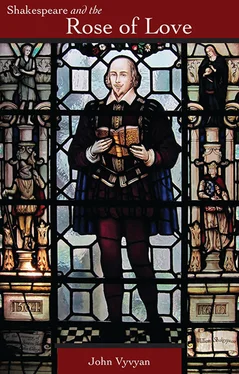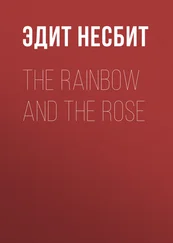We are wise girls to mock our lovers so.
This is what Shakespeare is also doing to these characters – mocking them, but not unkindly. In intention, it is a wise mockery, with the purpose of removing their imperfections and leaving them true men. And he is particular, in several places, to distinguish it from sarcasm and scorn. Rosaline, for instance, says to Berowne:
… the world’s large tongue
Proclaims you for a man replete with mocks,
Full of comparisons and wounding flouts,
Which you on all estates will execute
That lie within the mercy of your wit.
This habit, she tells him, is wormwood, which he must weed from his character before she will accept him:
A jest’s prosperity lies in the ear
Of him that hears it, never in the tongue
Of him that makes it…
So Shakespeare, I suggest, has defined for us the principle he is now following: he makes fun of the affectations of these characters, so that they may be rid of them and discover themselves. He gets a great deal of enjoyment from their foibles; but even to the most preposterous of them – Armado, Nathaniel and Holofernes – in spite of their absurdities, he is not unkind. A number of fine-seeming but unfruitful ideas are being put to the test of life and laughter.
In the opening scene, the aim of life that the king proposes to the three young lords is to be famous when they are dead:
Let fame, that all hunt after in their lives,
Live register’d upon our brazen tombs,
And then grace us in the disgrace of death…
This immortality in brass is to be won by study; and like all great victories it will be costly. The programme for the pursuit of fame that the king has drawn up, and in which the others have promised to keep him company, requires, in effect, the sacrifice of present life and all its disturbing emotions. They are to spend three years in monastic devotion to learning. During that time they will have one meal a day and fast altogether one day a week, they will sleep only three hours each night and not doze in between, and they will see no ladies – indeed, no woman is to be allowed within a mile of the court on penalty of losing her tongue. This is more than a plan, it is a command performance; and so the king exhorts them:
Therefore, brave conquerors – for so you are,
That war against your own affections
And the huge army of the world’s desires –
Our late edict shall strongly stand in force:
Navarre shall be the wonder of the world…
The edict is reinforced by a document, setting out these forbidding rules, which each of them is to sign:
You three, Berowne, Dumain, and Longaville,
Have sworn for three years’ term to live with me,
My fellow-scholars, and to keep those statutes
That are recorded in this schedule here:
Your oaths are pass’d; and now subscribe your names,
That his own hand may strike his honour down
That violates the smallest branch herein…
Dumain and Longaville sign submissively. Berowne also signs, but it is his part to protest. The king’s goal lies in the future, so far off that it is beyond the horizon of mortality: Berowne therefore – on the assumption that ‘the future was invented to spoil the present’ – puts the case for living now:
At Christmas I no more desire a rose
Than wish a snow in May’s new-fangled shows,
But like each thing that in its season grows.
The season of this play, in every sense, is spring: it is the month of May. And so Berowne is naturally putting the case for love, ‘whose month is ever May’. The audience is led to feel that this point of view is right: the king, with his concern for autumn fruit, is trying to live at the wrong time of year. But Berowne is not opposed to learning, provided that the subject be well-chosen:
Study me how to please the eye indeed,
By fixing it upon a fairer eye…
To do this, he suggests, will illuminate the student, instead of damaging his sight. It will be pleasanter and more valuable, since little is to be won from words:
These earthly godfathers of heaven’s lights,
That give a name to every fixed star,
Have no more profit of their shining nights
Than those that walk and wot not what they are.
Too much to know is to know naught but fame;
And every godfather can give a name.
In view of what is to come, we may notice that Shakespeare implies more by these lines than the meaning that suffices in this context. The name is not the star, the word is not the truth. And it is to the real nature of the star – love, in this play – that he will lead his characters at last. Meanwhile, Berowne has put the case for living in season, and enlisted the sympathies of the audience, although the king’s rejoinder is undeniably apt:
How well he’s read, to reason against reading!
Although they all laugh at him, Berowne is not silenced; he carries the argument deeper: this studious seclusion, to which they are now in honour vowed, is a dereliction of duty. This is his best card, with which he will take the act. He has already predicted that natural temptations will make them all foresworn; now he reminds the king that the oath, if kept to the letter, will conflict with his obligations. For reasons of state, he must receive the Princess of France, who is coming on a special embassy from her father. Berowne thus exposes the vow as a monstrosity:
So study evermore is over-shot;
While it doth study to have what it would,
It doth forget to do the thing it should…
And the thing it should is not the pursuit of fame, recorded on a brazen tomb, but first of all the discharge of human responsibilities and the exploration of the possibilities of life. The king admits that he had forgotten the princess, and will have to meet her; and henceforth the oath is merely a joke – the question is not whether it will be broken, but when and how. It is altogether shattered, in the end; and yet learning itself is not discredited, but only the kind of learning that is divorced from loving and living. And we are left with the impression that these things should not be fragments, but a whole: each has need of the others.
Since temptations become immensely important in Shakespeare’s mature work, it is interesting to see that even at this stage he has begun to take notice of their dramatic possibilities; but, which is surprising, the first use he makes of them is for laughter. The young men have taken an oath which they ought not to have taken; and so, when they are tempted to break it, they are really being ‘tempted’ to do right. This is ingenious and amusing; and it alerts us to a more important point: Shakespeare’s structural principles remain remarkably similar whatever kind of play he is writing. And as his work proceeds, we begin to suspect that he is aiming to create an ideal dramatic form – founded on Terence, but vastly enriched – that will suit all the purposes Polonius could think of, or even that Shakespeare himself had in mind.

Postponing consideration of the sub-plot, we may now pass to the second act. The Princess of France and her retinue, including three provocative ladies – one for each of the king’s lords we rightly guess – have arrived. But her gentleman-in-waiting, Boyet, informs her:
Navarre had notice of your fair approach…
… Marry, thus much I have learnt:
He rather means to lodge you in the field,
Like one that comes here to besiege his court,
Than seek a dispensation for his oath…
In this, there is a clear ring of challenge; for she is not only a brilliantly witty princess, but also, we must certainly infer, the allegorical figure of Love and Beauty; and it is presumptuous for a young man, king though he be, to keep her waiting in the fields.
Читать дальше












